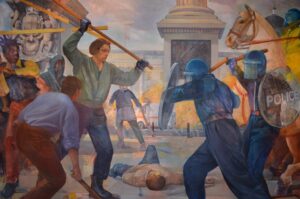
The Struggle for Economic Justice
By Eamonn Mullally
In the annals of history, few events encapsulate the spirit of collective action as vividly
as the Poll Tax riots of the late 20th century. This period of social upheaval and dissent
marked a turning point in the relationship between the government and its citizens, as
thousands took to the streets to voice their opposition to an unjust taxation system.
The Poll Tax – officially known as the Community Charge, was introduced in
Scotland in 1989 and in England and Wales in 1990. It was a per capita tax levied on every
adult resident, regardless of their income or ability to pay. This system replaced the previous
rates, which were based on property values, and was widely criticized for its regressive
nature. The burden of the tax fell disproportionately on low-income households, while
wealthier individuals found themselves paying relatively less.
The implementation of the Poll Tax was met with widespread outrage. The
streets of cities and towns across the United Kingdom became the battlegrounds for a war of
economic justice. One of the most significant demonstrations took place on 31 st March, 1990,
in Trafalgar Square, London. Over 200,000 people gathered in a peaceful protest that
quickly escalated into one of the most intense confrontations between the police and the
public in recent memory.
As the demonstration progressed, tensions rose, and clashes erupted between the
protesters and the authorities. The air was thick with the acrid smell of tear gas, and the
streets echoed with the sounds of shouting, the clatter of batons against shields, and the
chanting of impassioned slogans. The scene was a stark testament to the frustration and
desperation felt by many who saw the Poll Tax as an affront to their dignity and a blatant
disregard for economic equity.
The media coverage of the riots brought the issue into the living rooms of households
across the nation. Images of police in full riot gear clashing with protesters, burning
barricades, and shattered shop windows dominated the news cycles. These visuals served
to galvanize public opinion and amplify the calls for change. The riots were not merely acts
of vandalism and violence; they were the manifestation of a deeply rooted dissatisfaction
with a system that seemed to favour the wealthy at the expense of the working class.
In the aftermath of the riots, the government, led by Prime Minister Margaret Thatcher,
found itself under immense pressure. The Poll Tax had become a symbol of the
administration’s disconnect from the struggles of ordinary citizens. The widespread
opposition to the tax and the civil unrest it sparked played a significant role in Thatcher’s
eventual resignation in November 1990. Her successor, John Major, moved swiftly to
address the issue, and the Poll Tax was replaced by the Council Tax in 1993, which
considered the value of properties and the ability of residents to pay.
The legacy of the Poll Tax riots extends beyond the immediate policy change. It serves
as a powerful reminder of the impact of collective action and the importance of civic
engagement. The riots underscored the principle that governance should be equitable and
just, and that the voices of the marginalized must be heard and respected. The events of
that tumultuous era continue to resonate today, as societies around the world grapple with
issues of economic disparity and the role of government in ensuring fairness and justice.
As we reflect on the Poll Tax riots, it is essential to recognize the courage and
determination of those who stood up against an unjust system. Their actions were not in
vain; they reshaped the landscape of British politics and reaffirmed the power of the people
to effect change. The Poll Tax riots remain a poignant chapter in the history of social justice,
a testament to the enduring struggle for economic equality, and a reminder that the fight for
fairness is a continuous journey.
The Poll Tax riots were more than just a series of protests; they were a pivotal
moment in the fight for economic justice. The intensity of the streets during that period, the
collective power of the citizens, and the ultimate triumph of their cause highlight the enduring
importance of civic activism. The legacy of the Poll Tax riots serves as both a historical
milestone and an enduring inspiration for future generations committed to the principles of
equity and justice.
To discover more about the events of 31 st March 1990 and other examples of how ordinary
people have achieved extraordinary changes, join Eamonn on his new guided tour exploring
Protest and Rebellion – The English Way.
“History Painting, 1993-1994, by John Bartlett – The Poll Tax Riot, Trafalgar Square, 31 March 1990” by Ben Sutherland is licensed under CC BY 2.0.
